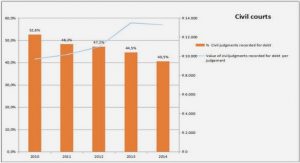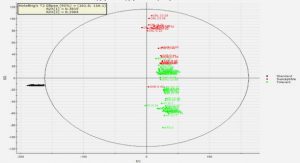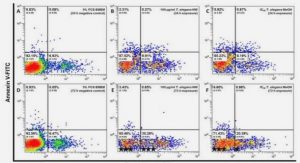Get Complete Project Material File(s) Now! »
INTRODUCTION
Librarians and faculty have long assumed that researchers on postgraduate level have adequate standards of information literacy (Conway, 20111:121; Streatfield, Allen & Wilson, 2010:231; Booth, 2007; Kong, Hunter & Lin, 2007:154; Machet, 2005:193). Previous efforts to train and support postgraduate students in information literacy were therefore mostly based on undergraduate programmes, which often concentrate on a narrow set of generic information literacy skills, rather than focusing on discipline-specific postgraduate needs (Streatfield, Allen & Wilson, 2010:238; Green & Macauley, 2007:317). Support in the past also focused mainly on information searching and retrieval skills regarding specific information retrieval tools (Adams, Buetow, Edlin et al., 2016:2; Hall & Jaquet, 2016:1020; Brewerton, 2012:104; Tautkeviciene, 2011:2, Green, 2010:316; Kohl-Frey, 2008:136; Jankowska, Hertel & Young, 2006:61). In addition, many previous studies were guided by a needs analysis approach only, without supplying more specific guidelines for improving specific skills (Randall et al., 2008; Rempel, 2008; Marcus, Covert-Vail & Mandel, 2007;
Rowlands & Fieldhouse, 2007; Stein et al., 2006; Wright et al., 2006).
Along with universities being required to demonstrate their effectiveness regarding student outcomes, there is a growing trend among academic libraries to increase their value to various communities on campus (Soria, Fransen & Nackerud, 2013:147). One such community is postgraduate researchers; the literature confirms gradually developing awareness of the pressing, scattered, unique and complex needs of this group in higher education institutions (Hall & Jaquet, 2016:1016; Brewerton, 2012:97, Blanton-Kent et al., 2010:1; Hoffmann et al., 2008; Green & Macauley, 2007:317; Wainwright, 2005:452).
Radical transformations taking place in scholarly communication and practice in recent years (Bourgh, Coleman & Erway, 2009:1) have resulted in growing recognition that various research skills need to be developed on postgraduate level, and that more intentional guidance may be required (Dash, 2015:146; Mamtora, 2013:355; O’Grady & Beam, 2011:76; Streatfield, Allen & Wilson, 2010:237; Rempel, 2008:157; Booth, 2007; Genoni, Merrick & Wilson, 2006:743). Many academic libraries are creating new positions to assist specifically 1 In-text references are according to date; most recent references first. If multiple references have the same date of publication, they are presented in alphabetical order according to author. postgraduate researchers, e.g. “Research support librarian”, “Research support specialist”, and “Research liaison manager” (Brewerton, 2012:98). Librarians’ efforts to engage more deeply in the workflow of scientific research and postgraduate students’ research needs, have, however, still been marginal (O’Grady & Beam, 2011:76; Housewright & Schonfield, 2008:31; Rempel, 2008:163; Jankowska, Hertel & Young, 2006:60; Wright et al., 2006:141).
According to Exner (2014:461), information literacy training for researchers seldom takes original research processes into consideration, and no guidance on information literacy support is given to researchers in different faculties. Literature confirms challenges in meeting the needs of postgraduate students and their supervisors (Hall & Jaquet, 2016:1021), and many academic libraries may therefore currently be failing to deliver the right kind of training and guidance to postgraduate researchers (Bracke, 2011:72; Streatfield, Allen & Wilson, 2010:230; Gomersall, 2007:301). This sets the rationale for a study on the research information literacy needs of postgraduate researchers.
CHAPTER 1: INTRODUCTION AND BACKGROUND TO STUDY .
1.2 BACKGROUND
1.3 PURPOSE, OBJECTIVES, CONTRIBUTION AND VALUE OF STUDY
1.4 STATEMENT OF THE PROBLEM, RESEARCH QUESTION AND SUB-.
1.5 ASSUMPTIONS
1.6 METHODOLOGY.
1.7 STUDY DEMARCATION.
1.8 LITERATURE REVIEW.
1.9 KEY TERM CLARIFICATION.
1.10 DIVISION OF CHAPTERS.
1.11 CONCLUSION.
CHAPTER 2: LITERATURE ANALYSIS TO CONCEPTUALISE ARIL
2.1 INTRODUCTION.
2.2 EXTENDED CLARIFICATION OF CONCEPTS FUNDAMENTAL TO STUDY
2.3 INFORMATION LITERACY IN DIFFERENT CONTEXTS
2.4 MOTIVATION FOR A NEW CONCEPT – ARIL
2.5 CONCLUSION.
CHAPTER 3: EXPLORING ARIL WITH REFERENCE TO TYPICAL ACADEmIC ENGINEERING RESEARCH PROCESSES
3.1 INTRODUCTION.
3.2 RECLECTION ON WHAT IT MEANS TO BE AN ENGINEER.
3.3 INFORMATION LITERACY IN THE CONTEXT OF ACADEMIC RESEARCH – PERSPECTIVES FROM THE LITERATURE
3.4 CONCLUSION.
CHAPTER 4: RESEARCH DESIGN AND METHODOLOGY
CHAPTER 5: DATA ANALYSIS AND FINDINGS OF QUANTITATIVE DATA .
CHAPTER 6: RESULTS OF QUALITATIVE DATA .
CHAPTER 7: DISCUSSION OF FINDINGS AND PROPOSAL OF AN ADVANCED RESEARCH INFORMATION LITERACY FRAMEWORK
CHAPTER 8: SUMMARY OF FINDINGS, RECOMMENDATIONS AND CONCLUSION
REFERENCES






